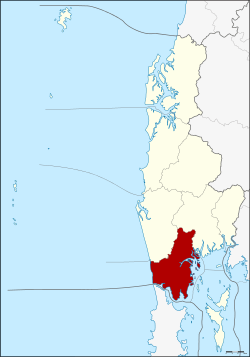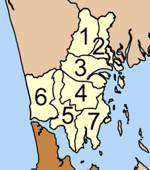Takua Thung District
| Takua Thung ตะกั่วทุ่ง | |
|---|---|
| Amphoe | |
 Amphoe location in Phang Nga Province | |
| Coordinates: 8°23′32″N 98°27′7″E / 8.39222°N 98.45194°ECoordinates: 8°23′32″N 98°27′7″E / 8.39222°N 98.45194°E | |
| Country |
|
| Province | Phang Nga |
| Area | |
| • Total | 610.8 km2 (235.8 sq mi) |
| Population (2548) | |
| • Total | 40,392 |
| • Density | 66.1/km2 (171/sq mi) |
| Time zone | THA (UTC+7) |
| Postal code | 82130 |
| Geocode | 8204 |
Takua Thung (Thai: ตะกั่วทุ่ง) is a district (amphoe) in the province Phang Nga in the south of Thailand.
History
Mueang Takua Thung is an ancient city same as Phang Nga and Takua Pa. The old city hall was located in Ban Khai, Tambon Bang Thong, Amphoe Thai Mueang. In 1894 Burmese troops attacked Mueang Takua Pa. Thalang and Takua Thung were the next targets. Then people of Takua Thung moved the city center to Tambon Kra Som, where it is still located today.
Takua Thung was downgraded to be a district of Phang Nga in 1899.
Geography
Neighboring districts are (from the north clockwise) Thai Mueang and Mueang Phangnga. To the southwest is the Phang Nga Bay, to the south is the district Thalang of Phuket Province, separated by the Pak Phra strait. To the west is the Andaman Sea.
Namtok Raman Forest Park protects 0.2 km² around a scenic waterfall. The park was established on October 26, 1983. Most of the coast to the Phang Nga bay is part of the Ao Phang Nga National Park.
The most important temple within the district is Wat Suwannakhuha, also commonly known as Wat Tham (lit. cave temple) due to several caves within a hill inside the temple area. Especially the largest of these caves is decorated with many Buddha images as well as stalactites and stalagmites.
Administration
The district is subdivided into 7 subdistricts (tambon), which are further subdivided into 68 villages (muban). There are two townships (thesaban tambon) within the district - Krasom and Khok Kloi - each covering parts of the same-named tambon. Each of the tambon is administrated by a Tambon administrative organization (TAO).
|
 |